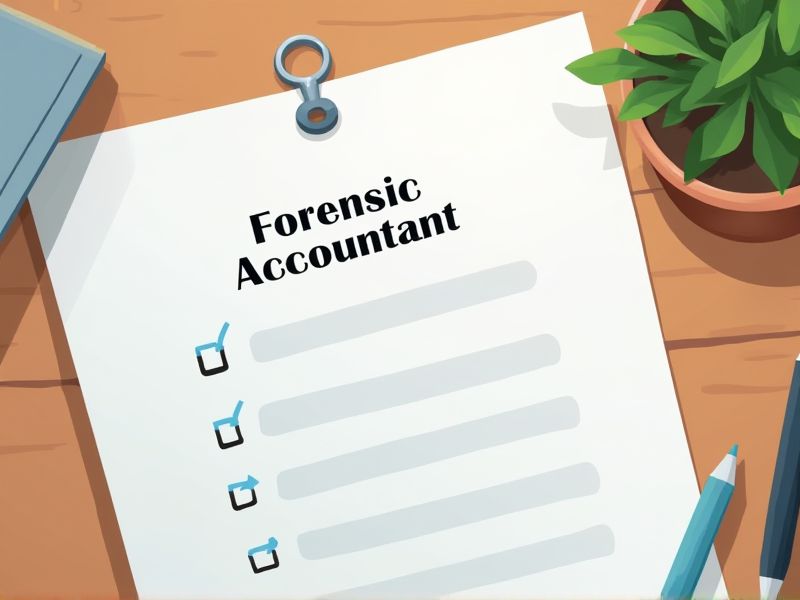
Forensic accounting requires specialized skills to effectively analyze financial evidence and investigate fraud or financial discrepancies. Obtaining certain certifications validates an accountant's expertise in these areas, enhancing credibility and proficiency. The right credentials determine a professional's ability to apply rigorous standards in legal and financial investigations. Here are some important certifications you may need for a forensic accountant.
Certified Fraud Examiner (CFE)
Organizations increasingly face complex financial fraud schemes, leading to a heightened demand for Certified Fraud Examiners (CFEs) within forensic accounting. CFEs possess specialized knowledge in fraud detection and prevention, enhancing a forensic accountant's capability to uncover fraudulent activities. With their expertise, CFEs aid in ensuring the integrity and accuracy of financial statements, thereby increasing stakeholders' trust. Employing CFEs also supports legal processes by providing expert testimony and comprehensive fraud analysis, streamlining the prosecution of financial crimes.
Certified in Financial Forensics (CFF)
The Certified in Financial Forensics (CFF) credential enhances a forensic accountant's credibility, establishing expertise in forensic accounting principles crucial for complex financial investigations. This certification signals to potential clients and employers a specialized proficiency in areas like fraud detection and financial litigation support. Holding the CFF designation often results in increased career opportunities and the potential for higher earning potential within the forensic accounting field. The rigorous requirements for obtaining and maintaining the CFF credential ensure continuous professional development and adherence to industry standards.
Certified Public Accountant (CPA)
A Certified Public Accountant possesses in-depth knowledge and skills in accounting principles, which are crucial for forensic accountants analyzing financial discrepancies. The CPA credential ensures adherence to high ethical standards and professional conduct, vital in investigating financial fraud and disputes. CPAs are trained to interpret complex financial data, making them adept at piecing together financial puzzles in legal contexts. Being a CPA provides credibility in court, often a requirement for presenting financial findings as expert testimony.
Certified Forensic Accountant (Cr.FA)
The designation of a Certified Forensic Accountant (Cr.FA) validates specialized expertise in investigating financial discrepancies, which enhances credibility in legal contexts. Complex financial crimes often require in-depth analyses, and a Cr.FA provides the analytical skills necessary for uncovering financial misconduct. As economic activities become more sophisticated, the demand for forensic accountants with advanced certification ensures adherence to evolving standards and methodologies. Certification helps build trust with clients and legal entities, as it signifies a commitment to upholding professional and ethical standards in financial investigations.
Certified Financial Crime Specialist (CFCS)
Forensic accountants often deal with intricate financial crimes, making the specialized training of a Certified Financial Crime Specialist (CFCS) essential for effectively identifying and combating sophisticated fraud schemes. The CFCS designation equips accountants with advanced knowledge of anti-money laundering, counter-terrorist financing, and fraud prevention techniques, enhancing their investigative capabilities. When forensic accountants hold the CFCS credential, they are better prepared to stay current with evolving financial crime trends and regulatory requirements. Organizations seeking to protect assets and maintain compliance benefit from employing CFCS-certified forensic accountants due to their comprehensive grasp of financial crime frameworks.
Certified Fraud Specialist (CFS)
The presence of a Certified Fraud Specialist (CFS) in forensic accounting enhances the identification and mitigation of financial discrepancies. Their expertise in detecting fraudulent activities increases the accuracy and reliability of financial assessments. With specialized training, a CFS efficiently navigates complex legal environments, supporting legal proceedings related to financial crime. This qualification also raises professional credibility, attracting clients seeking comprehensive anti-fraud solutions.
Certified Anti-Money Laundering Specialist (CAMS)
Forensic accountants deal with complex financial investigations where money laundering activities frequently surface. Holding the Certified Anti-Money Laundering Specialist (CAMS) designation equips them with specialized knowledge to detect and prevent illicit financial transactions. Enhanced skills in identifying suspicious activities directly improve the accuracy and efficiency of their investigations. Regulatory compliance and legal expertise from CAMS credentials reduce the risk of oversight during financial analyses.
Chartered Accountant (CA)
Chartered Accountants possess expertise in financial principles, which aids forensic accountants in investigating and interpreting complex financial data. Their knowledge of tax laws and auditing standards ensures accurate analysis of suspicious transactions. CA qualifications provide credibility, enhancing the trustworthiness of forensic investigations. Their training enables them to identify discrepancies, supporting legal proceedings with reliable evidence.
Certified Information Systems Auditor (CISA)
Forensic accountants require a broad understanding of information systems to effectively identify and trace fraud, and a CISA certification equips them with this essential knowledge. The certification ensures proficiency in assessing IT systems' controls, which is crucial when evaluating the integrity of financial data. In cases of financial discrepancies, a forensic accountant with CISA skills can better analyze digital evidence and system logs. Organizations benefit from reducing risk exposure, as professionals with CISA credentials can expertly navigate system complexities and enhance overall audit quality.
Certified in Risk and Information Systems Control (CRISC)
A Forensic Accountant requires the Certified in Risk and Information Systems Control (CRISC) credential to effectively identify and assess IT-related risks. This certification equips them with the necessary skills to analyze and mitigate vulnerabilities within financial systems. By understanding the intricacies of risk management, a forensic accountant can enhance the reliability and accuracy of financial investigation processes. Without CRISC, identifying potential information system threats and devising strategic responses becomes challenging.
Summary
Gaining certifications as a forensic accountant enhances your credibility and expertise, which often leads to more career opportunities and increased earning potential. Employers may view your certified status as an assurance of your skills, thereby placing greater trust in your analyses during investigations. This recognition can lead to more complex and high-profile cases, expanding your professional experience. Over time, your reputation as a certified forensic accountant will grow within the industry, aligning you with elite professionals in financial investigation.
